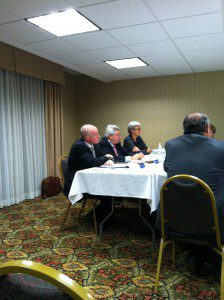
Westfield State University Board Chairman John Flynn III, Finance Committee Chairman Kevin Queenin, and University President Dr. Elizabeth Preston (Left to Right) listen to discussion on policy at Thursday evening’s Finance Committee meeting (Photo by Peter Francis)
STURBRIDGE – Common business practices from the corporate world may soon be coming to Westfield State University.
A meeting of the finance committee of the school’s board of trustees was held at the Sturbridge Host Hotel Thursday evening to mull over potential policy changes.
In the wake of the ongoing circus involving the spending of recently retired University President Dr. Evan Dobelle, Board of Trustees Chairman John Flynn III and Finance Chairman Kevin Queenin called the meeting to hear recommendations on how to avoid future spending issues from the University’s Vice President of Administration and Finance, Milton Santiago, and David Dilulis, of the Braintree-based accounting firm O’Connor and Drew.
Their recommendations could most aptly be described as common sense.
“(The O’Connor and Drew) report had many findings… credit cards were used for personal charges,” Santiago said. “The recommendation for that would be to strictly adhere to the policy. (Policy says) that if you use a credit card for personal charges, your credit card will be revoked, and you will lose the privilege of that card. Enforcing that policy is the recommendation that we have in regard to those violations.”
University-issued credit cards were the evening’s main focus, as over 40 cards were given to university personel according to Santiago, a number that is well above that of other institutions, and one he is looking to cut.
“We’re looking to reduce the number of credit cards… 20 is my goal,” said Santiago, to which Queenin skeptically asked Dilulis whether “that’s a lot or a little.”
“It depends on the needs of the institution, he answered. “Every institution is a little different.”
It was Dilulis’ firm who was brought in to lead an investigation into the spending practices of the Dobelle administration this summer, an investigation that Dobelle and his attorney Ross Garber are now claiming was done illegally.
“There are other universities that are using ‘P (procurement) cards’, which control dollar amounts of spending per month, per day, and the types of spending,” Dilulis added.
Santiago said the school has already been using eight P cards, mainly in the facilities departments.
“They allow for quick purchases of items that are needed, and cut back on paperwork,” he said, adding that the university has already gotten rid of several of the credit cards, bringing the current total to around 32.
Flynn asked why the institution needs the cards in the first place.
“We need to be looking at what the purpose of a credit card is at a public institution,” he said, before adding that, as Chief Administrative Officer of the Massachusetts State Police, he is aware of only two credit cards that are issued to that agency, which employs 3,000 people.
“It’s absolutely important to have credit cards for enrollment management staff, the recruiters, people who are on the road constantly and don’t make a lot of money to put out,” Santiago said. “Besides them, someone would have to justify the means.”
Dilulis added that one way to shore up spending issues would be to appoint one person to handle all travel-related duties.
“Within the credit card policy, it mentions that they’re used primarily for travel and entertainment-type expenses,” he said. “If you had centralized travel within the organization, that person would control all (the travel). If you had that, you wouldn’t need 20 people making their own accomodations — you’re bypassing procurement.”
Flynn and Board Member Terrell Hill both spoke out on behalf of reimubursement for travel expenses.
“The concept of reimbursement is much more appealing to me than the concept of advancement,” Flynn said. “It in and of itself eliminates 90 percent of the problem. I don’t think that’s rocket science.”
“It’s accountability. When you’re spending your own money, all of a sudden you get real attentive,” added Hill, an educator in Hartford, Conn. “When it’s other people’s money, (people) go slow. You only need a few people to be the guinea pigs, and word spreads fast. ‘I spent $300. You don’t have your receipt? You aren’t getting your money.'”
“We don’t need more policies. We need people following what is in place,” he said. “It’s time for a culture shift.”
After hearing the recommendations, it was agreed upon that a formal presentation will be proposed to the entire Board of Trustees at their December 12 meeting.
“Time is up. Everyone at the institution needs to understand that this is a priority, this is going to change,” Flynn said. “I dont want to rush to judgement… but we are going to move.”
Following the meeting, Flynn spoke to the assembled media regarding the discussion and how he thinks the proposed culture change will go over at the institution.
“We’re all in agreement that the policies prohibited the practices. These were policy violations,” he said. “It’s oversight and there needs to be continued oversight.”
“For the most part, I think people are being responsible,” he added. “I think folks who are responsible and appreciate the seriousness of having the authority to spend the taxpayer’s money look at this and say it’s a good thing.”

